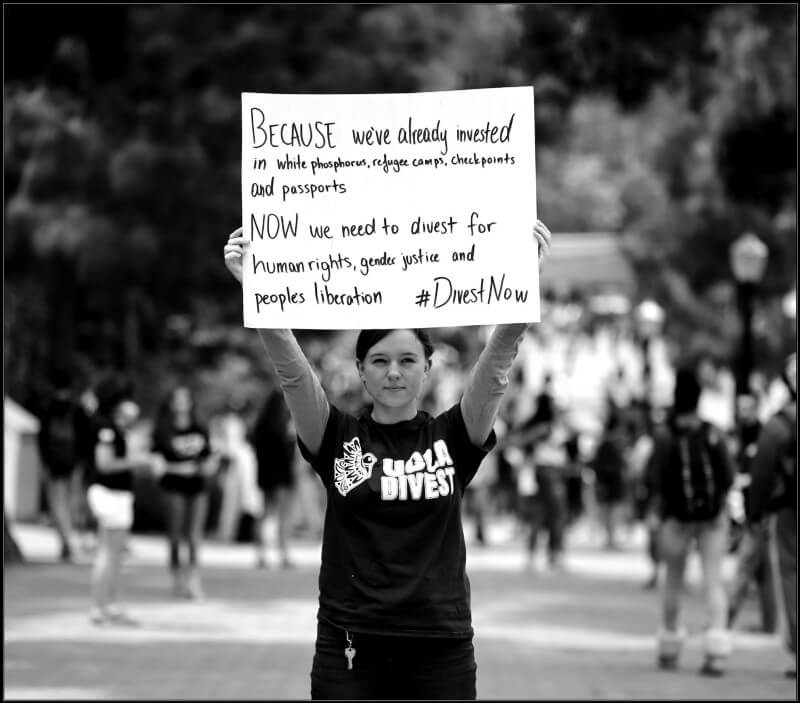Alex Kane reports from the UN where the Israeli Mission to the UN commandeered the General Assembly yesterday for a day-long pro-Israel pep rally, filled with an estimated 1,500 people–many of them college students–who listened to speakers rail against the boycott, divestment and sanctions (BDS) movement targeting Israel. The summit reflected the Israeli government’s increasing focus on the BDS movement.
Members of the New York City Council are pushing a bill that would require public colleges in the city to track anti-Semitism on campus. But Palestine solidarity activists say the bill is aimed at their activism. Students for Justice in Palestine (SJP) chapters have waged vociferous protests in recent months against Israel on campus that have alarmed pro-Israel advocates
Advocates of boycotting Israel are under attack in California, New York, Indiana, Virginia, Pennsylvania and Florida. Most of the bills under consideration would penalize people or businesses that support the boycott, divestment and sanctions (BDS) movement targeting Israel over human rights violations. The New York bill would create a blacklist of people or companies that support BDS–and post that list on a state website.
Israeli Prime Minister Benjamin Netanyahu will reportedly have a new English-language spokesperson in March: David Keyes, who has made a name for himself as an Internet freedom advocate. Keyes is the executive director of a group called Advancing Human Rights, and runs CyberDissidents.org, a database of Internet dissidents. Now Keyes, who has long-standing ties to the Israeli elite, is going to work for a man whose security forces have locked up dozens of Palestinian activists for social media posts in recent years.
A federal lawsuit filed last week alleges that U.S.-based tax-exempt entities who raise money for Israeli settlements are engaged in money-laundering and other crimes, and seeks a Treasury Department investigation into those activities. The lawsuit could bring attention to the widespread practice of Americans getting tax-deductions for donations that fund illegal Israeli settlements in the West Bank and East Jerusalem. “What’s going over there is wholesale violence, ethnic cleansing, theft of private property, murder and maiming of innocent civilians,” said Martin McMahon, one of the lawyers who worked on the suit. “This is not what 501c3s should be doing.”
In October, the graduate student government at UCLA agreed to fund an event on diversity–but on the condition that the gathering had no connection to the movement to divest from companies linked to the Israeli army. The funding stipulation has sparked a legal battle, with civil liberties groups saying that the stipulation is unconstitutional. Activists see the funding condition as one of the most brazen attacks on the rights of pro-Palestinian students to organize. “This is a wake up call to everybody as to what it means to be a [pro] Palestinian activist on campus,” says Yacoub Kureh, the president of UCLA’s SJP chapter.
A student at UC Santa Barbara was attacked by another student during a pro-Palestine protest this month. Palestine Legal, a group that defends Palestinian rights activists in the U.S., says the UC Santa Barbara incident was part of a larger campaign against student activists.
The recently released United Nations report on the 2014 war in Gaza meticulously documents last summer’s horror. The reports of Israeli executions of Palestinians, Israel’s aerial assaults on Palestinians in their homes in Gaza and other aspects of the assault have attracted the most attention, but the UN report also highlights what it calls “widespread human rights violations” by Israeli forces in the occupied West Bank and East Jerusalem. The document is a reminder that the uptick in tensions and violence last summer was not limited to Gaza. In fact, the human rights abuses the report looks at still occur near-daily in the West Bank and Jerusalem.
Israel’s top law enforcement authority has said that a call for the beheading of Palestinian citizens was not “necessarily” violent–and that Avigdor Lieberman, who made the call, did not violate the law against incitement. For Palestinians, the Attorney General’s decision highlights how the incitement law is applied differently depending on ethnicity. Palestinian citizens are routinely investigated and arrested for incitement to violence for comments that don’t come close to the edge of violent speech.









